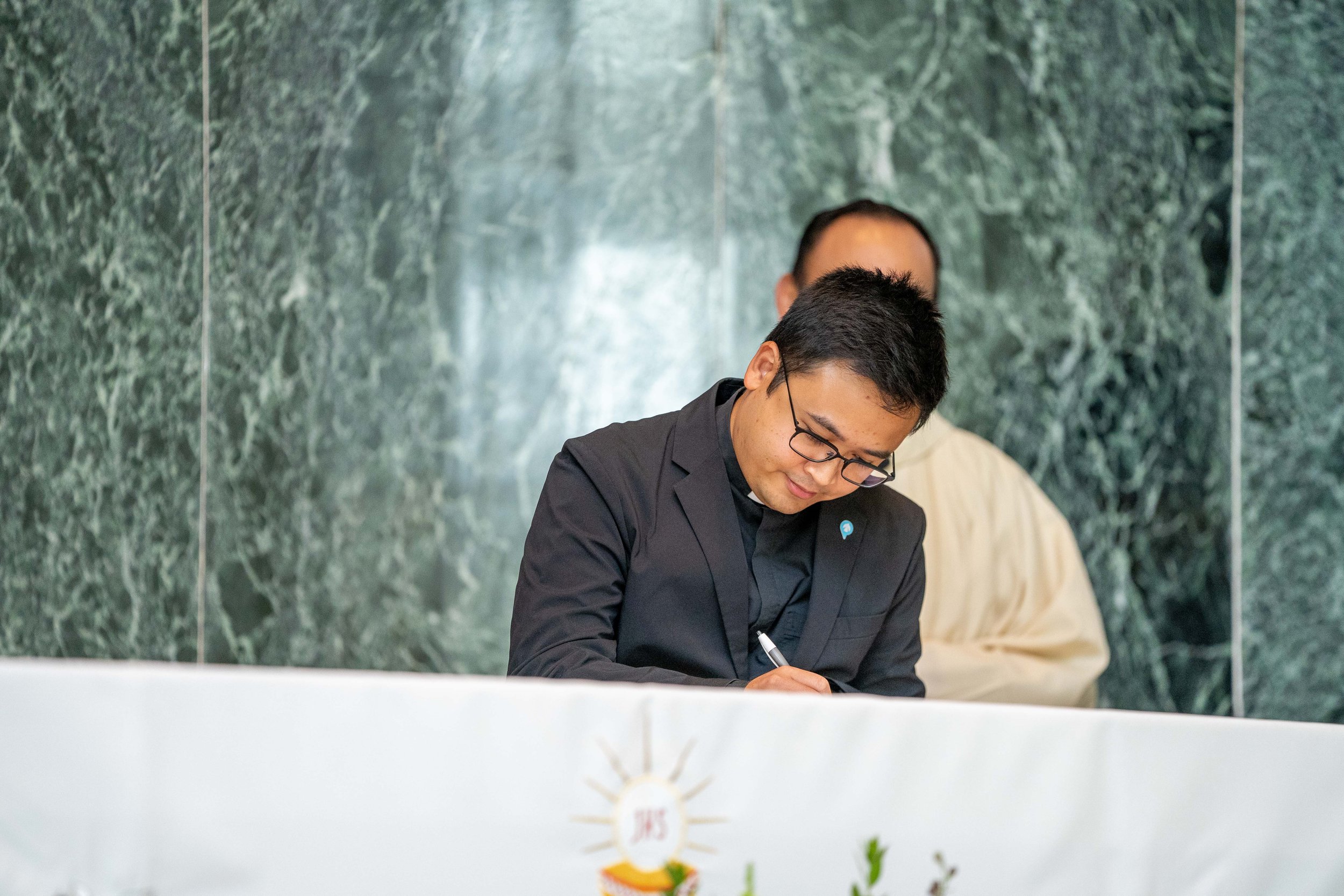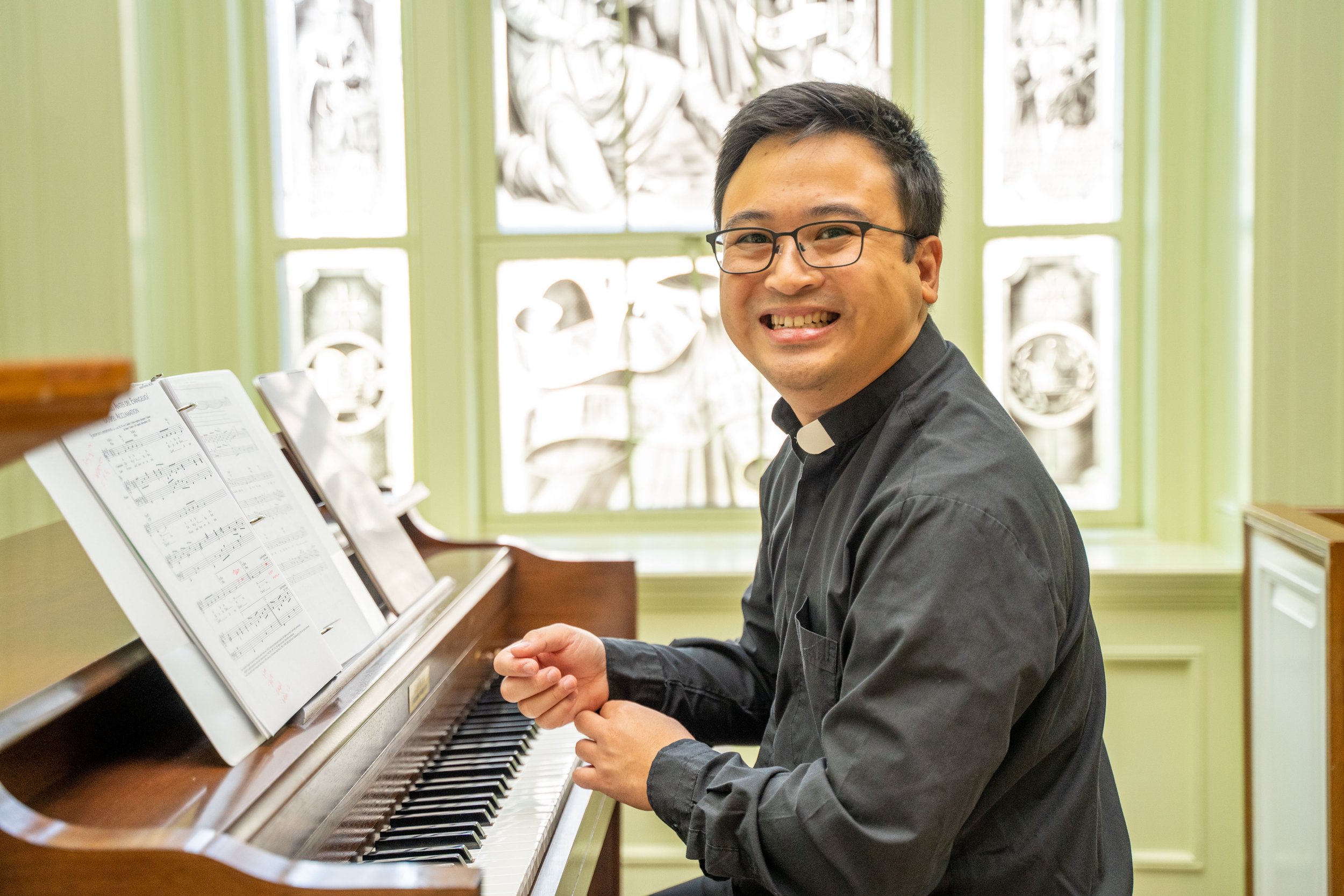
Scientist to Priest:
Fr. Dan Macalinao’s Story





In a culture of to-do lists, career ladders, and constant busyness, when do we have the time to truly look inward? The novitiate offered Fr. Dan Macalinao, CSP, the gift of time, a year to discern and reflect; time for stillness. That is part of what drew him to give the seminary a shot.
He was at a crossroads anyway. In 2016 he was wrapping up his PhD in cancer biology and he was feeling that a career in science no longer held the same passion that it used to.
Growing up in Manila, Philippines, he had always loved science. He received the four-year Freeman Asian Scholarship to attend Wesleyan University in Middletown, Conn. Although his parents were hesitant to send their 18-year-old son to the other side of the world, they had always encouraged Dan and his brother and sister to chart their own paths, and they knew that he would have limited opportunities in Manila.
His experience at Wesleyan was formative and “a place for growing up.” He had attended an all-boys Catholic school his whole life and had a very Catholic upbringing. There, he met a diverse, multicultural student body with many belief systems. It was the first time Dan thought about his own identity as a Catholic and Filipino.
He graduated in 2008 with a bachelor’s degree in molecular biology and biochemistry and moved to Bar Harbor, Maine, to work on glaucoma research at The Jackson Laboratory, the world’s largest biomedical research institute using mouse models to study human disease.
Bar Harbor is a small, tight-knit community whose population swells with visitors during the summer. Dan had always loved to sing, so he got involved in musical theater, a great place for meeting people and building relationships, and the choir of Holy Redeemer, the local Catholic church.
“You could feel how immersed you were in relationships. It was a great time for me just to be part of a community where everyone was seen, everyone felt like they belonged. It was a pretty special time for me.”
Dan knew the next step in any scientific field was to get a PhD. So he moved to New York City in 2011 to begin his program, doing cancer research at Memorial Sloan Kettering Cancer Center, one of the top cancer research institutes in the country.
Whereas in Bar Harbor there was one Catholic church, New York City was “a place where there was choice in what my Catholic experience might look like.”
He found St. Paul the Apostle, the Mother church of the Paulist Fathers, through a Google search. From the music to the preaching to the young people, Dan was immediately struck by its vibrancy.
“The joy of the community worshipping there was palpable, and it was the kind of joy that naturally spilled over to other people, the kind of joy that springs from the gospel – a community of disciples willing to break bread with one another, despite all our differences, and willing to go out into the world to share that joy.”
Toward the end of graduate school, he saw that while his peers were 100 percent committed to their fields, he felt increasingly drawn to people and being in their lives. He was also spending 12 hours or more at the church on Sundays – between the three choirs and other ministries – and enjoying it.
Around the same time, Fr. Dat Tran, the vocation director of the Paulist Fathers at the time, messaged him on Facebook and asked him to dinner.
“One of our initial conversations was to reflect back on – what makes you happy? What is life-giving for you?” If Dan enjoyed ministering at the church, “what does that say about what you value and where you want to spend your time? What might that be saying about where God is calling you?”
That’s how his process of discernment started. Those conversations slowly developed into thinking about religious life.
In another conversation, Dan paraphrases Fr. Dat, “You’re thinking about what you might want to do next. The novitiate is protected time to do this discernment. You’re not saying yes to priesthood, you’re saying yes to an invitation to go deeper.”
“The surprise of this life and the joy that comes from being with people in this setting where God’s spirit is so generous and surprising and to be situated in the midst of that is a very humbling gift to be given.”
He said to them, "Come, and you will see.” John 1:39
I've always nurtured a sense of curiosity – important in the field of science, but also in religious life as one needs to be curious about God, God's people, and the direction God is calling us. My entire life, Jesus has led me by the hand in all the various experiences of my life as if to say, "Come, and you will see." It's a radical trust, a loving trust. It's brought me here thus far; if I can continue to learn to trust in that love, I have no doubt that it will sustain me into the future. The more I entertain this curious invitation by Jesus, the more I am struck by just how unfathomably deep God's love goes.
Fr. Dan Macalinao, CSP
Home: Manilla, Philippines
Home Parish: St. James the Great in Manila, Philippines
Patron Saint: St. Paul the Apostle
Education: B.A. in Molecular Biology and Biochemistry, Wesleyan University; Ph.D. in Cancer Biology, Gerstner Sloan Kettering Graduate School of Biomedical Science
Current Location: Old St. Mary's Church in Chicago
Profile by Estefania Garcia.

Fr. Dan Macalinao, CSP
Home: Manilla, Philippines
Patron Saint: St. Paul the Apostle
Education: B.A. in Molecular Biology and Biochemistry, Wesleyan University; Ph.D. in Cancer Biology, Gerstner Sloan Kettering Graduate School of Biomedical Science
Current Location: Paulist House of Mission and Studies in Washington, DC
In a culture of to-do lists, career ladders, and constant busyness, when do we have the time to truly look inward? The novitiate offered Fr. Dan Macalinao, CSP, the gift of time, a year to discern and reflect; time for stillness. That is part of what drew him to give the seminary a shot.
He was at a crossroads anyway. In 2016 he was wrapping up his PhD in cancer biology and he was feeling that a career in science no longer held the same passion that it used to.
Growing up in Manila, Philippines, he had always loved science. He received the four-year Freeman Asian Scholarship to attend Wesleyan University in Middletown, Conn. Although his parents were hesitant to send their 18-year-old son to the other side of the world, they had always encouraged Dan and his brother and sister to chart their own paths, and they knew that he would have limited opportunities in Manila.
His experience at Wesleyan was formative and “a place for growing up.” He had attended an all-boys Catholic school his whole life and had a very Catholic upbringing. There, he met a diverse, multicultural student body with many belief systems. It was the first time Dan thought about his own identity as a Catholic and Filipino.
He graduated in 2008 with a bachelor’s degree in molecular biology and biochemistry and moved to Bar Harbor, Maine, to work on glaucoma research at The Jackson Laboratory, the world’s largest biomedical research institute using mouse models to study human disease.
Bar Harbor is a small, tight-knit community whose population swells with visitors during the summer. Dan had always loved to sing, so he got involved in musical theater, a great place for meeting people and building relationships, and the choir of Holy Redeemer, the local Catholic church.
“You could feel how immersed you were in relationships. It was a great time for me just to be part of a community where everyone was seen, everyone felt like they belonged. It was a pretty special time for me.”
Dan knew the next step in any scientific field was to get a PhD. So he moved to New York City in 2011 to begin his program, doing cancer research at Memorial Sloan Kettering Cancer Center, one of the top cancer research institutes in the country.
Whereas in Bar Harbor there was one Catholic church, New York City was “a place where there was choice in what my Catholic experience might look like.”
He found St. Paul the Apostle, the Mother church of the Paulist Fathers, through a Google search. From the music to the preaching to the young people, Dan was immediately struck by its vibrancy.
“The joy of the community worshipping there was palpable, and it was the kind of joy that naturally spilled over to other people, the kind of joy that springs from the gospel – a community of disciples willing to break bread with one another, despite all our differences, and willing to go out into the world to share that joy.”
Toward the end of graduate school, he saw that while his peers were 100 percent committed to their fields, he felt increasingly drawn to people and being in their lives. He was also spending 12 hours or more at the church on Sundays – between the three choirs and other ministries – and enjoying it.
Around the same time, Fr. Dat Tran, the vocation director of the Paulist Fathers at the time, messaged him on Facebook and asked him to dinner.
“One of our initial conversations was to reflect back on – what makes you happy? What is life-giving for you?” If Dan enjoyed ministering at the church, “what does that say about what you value and where you want to spend your time? What might that be saying about where God is calling you?”
That’s how his process of discernment started. Those conversations slowly developed into thinking about religious life.
In another conversation, Dan paraphrases Fr. Dat, “You’re thinking about what you might want to do next. The novitiate is protected time to do this discernment. You’re not saying yes to priesthood, you’re saying yes to an invitation to go deeper.”
Five and a half years later, Dan, 36, is still grateful to be in the Paulist community, in his third year of theology studies in Washington, D.C.
“The surprise of this life and the joy that comes from being with people in this setting where God’s spirit is so generous and surprising and to be situated in the midst of that is a very humbling gift to be given.”

